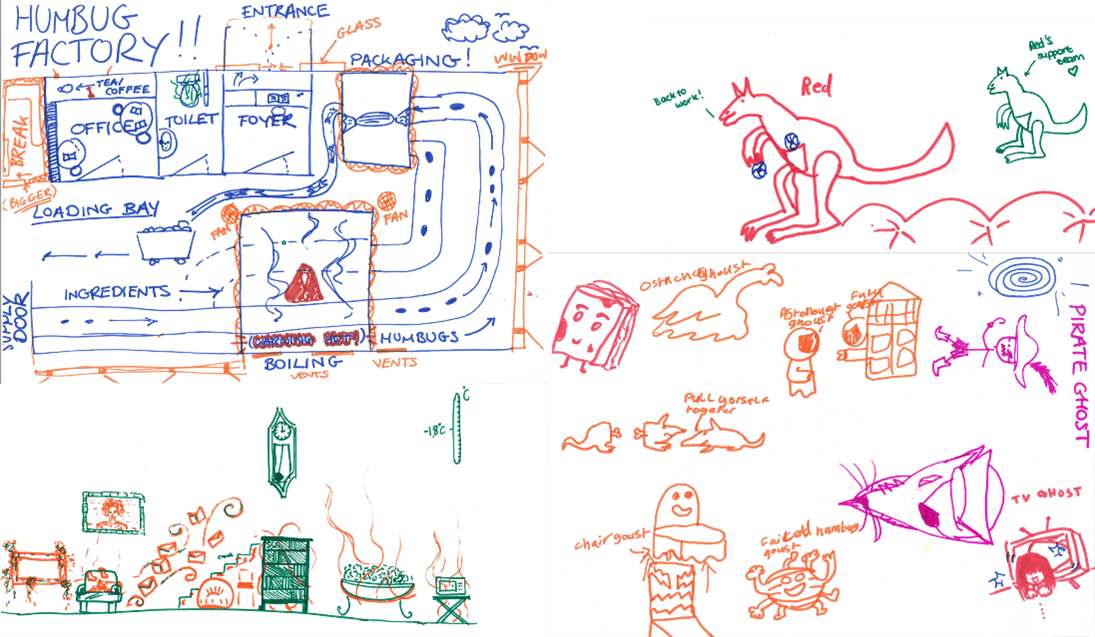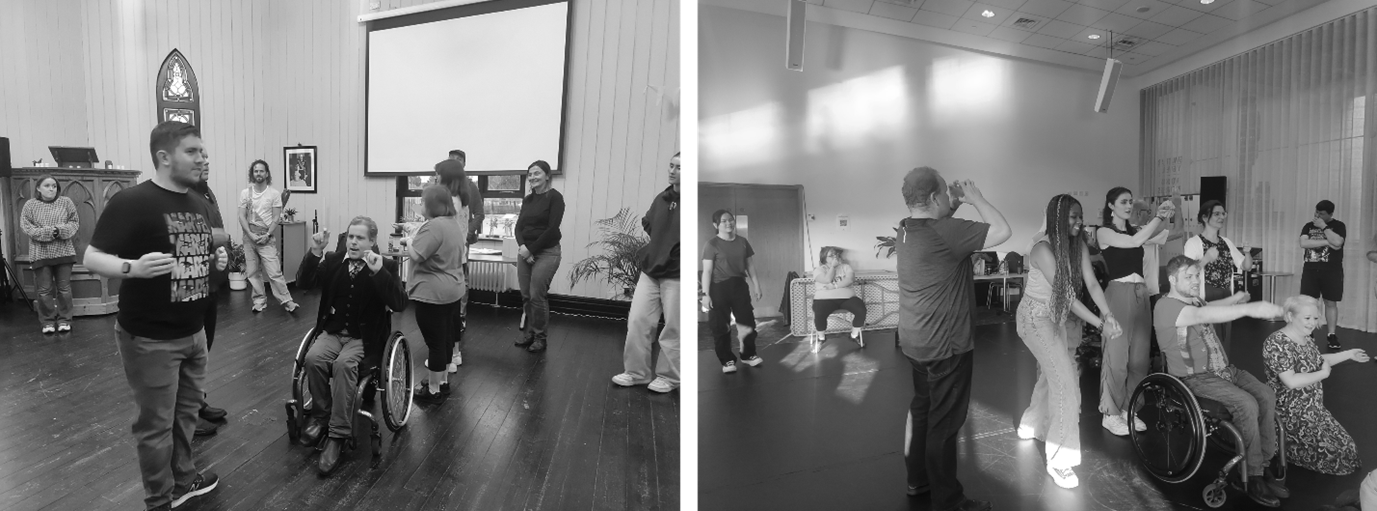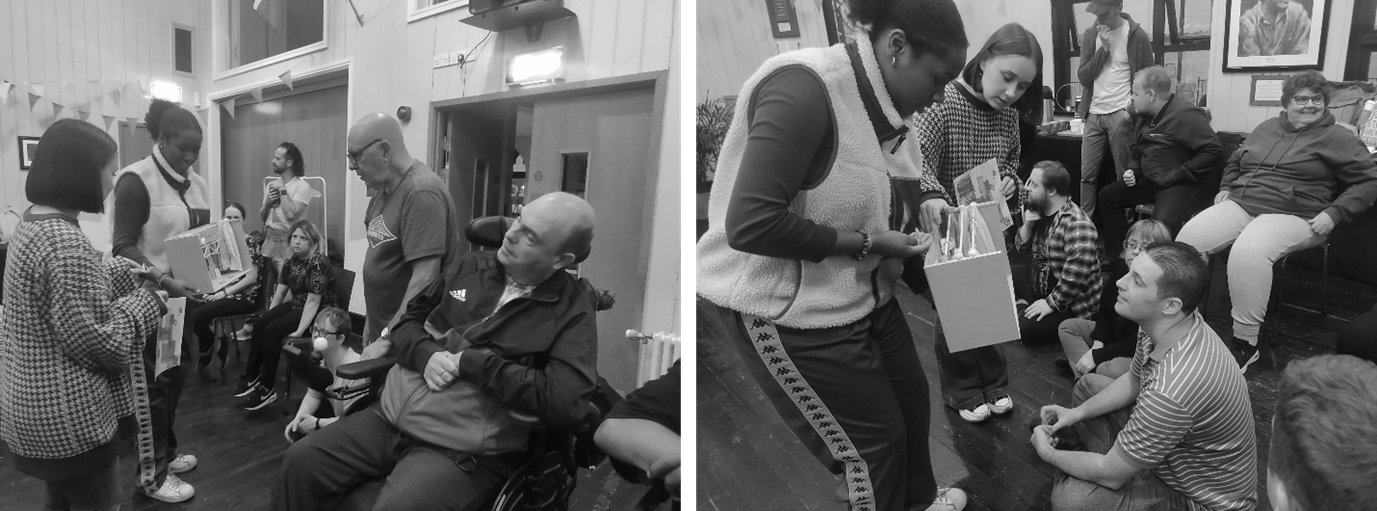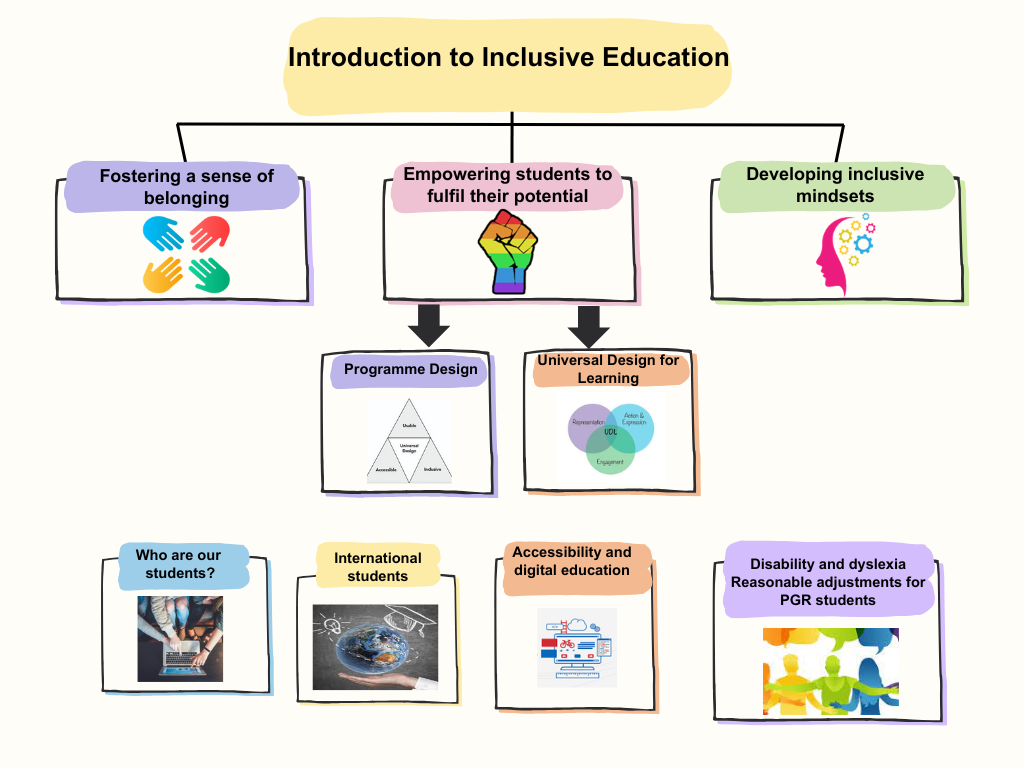Inspiring inclusive leaders
Inspiring students to become champions of inclusivity, equipping them with the skills to foster and support inclusive environments
We all have a role to play in creating and sustaining a respectful, diverse and inclusive university community, thus engaging in inclusivity topics, discussions and wider global issues are fundamental in an inclusive learning environment. However, research suggests that academic departments rarely discuss inclusivity, unless it is a focus of the discipline (Perez et al. 2020). Without specific training or induction in EDI, and ongoing sustained conversation on the implications of EDI, students with minoritised identities can feel marginalised and tokenised, if not overtly targeted, based on their identities.
Cardiff University is committed to embedding EDI practices across the institution. An example is the ‘EDI for Students’ module, which all academic staff have access to, and all incoming students are timetabled to complete in the first few weeks of their university experience. There are two iterations, for undergraduate and post-graduate students. See the trailer here:
To complete EDIAware, log onto Learning Central and in ‘Organisations’ locate the undergraduate module EDIAware-ORG-UG (English medium) orEDIAware-ORG-UG-Cymraeg (Welsh medium Alternatively access the postgraduate taught module EDIAware-ORG-UG-PGT (English medium) or EDIAware-ORG-UG-PGT-Cymraeg (Welsh medium). If you need access, contact the Digital Education team for access.
The EDI module provides a starting point for a student’s awareness of EDI principles. However, there is a need for academic departments to consistently provide intentional opportunities for individuals to learn about EDI within their disciplines and fields. if we are to create inclusive learning environments and prepare students to contribute to a complex and interdependent global society’ (Parsons et al. 2020: 133).
Providing development and training in EDI isn’t just about ensuring our University provides an inclusive environment in which to learn, it is also about providing students with the vital skills needed to be inclusive leaders of the future. An important aspect of student experience is the broader educational gain students achieve from higher education. As a sector we are anecdotally driven by data however when focussed on the educational gain university brings that is not so easily measured. It is the richness of the wider experience and skills of communication, working with diverse groups, handling difficult conversations, and leaning into the uncomfortable that equip students to become inclusive leaders.
Here you will find 2 considerations from the student perspective:
Encouraging respectful debate on difficult topics helped broaden my understanding.
‘Providing regular opportunities to discuss EDI topics in a safe and respectful space. In practice, this can be challenging to manage, but when done thoughtfully, it builds trust and mutual respect. I’ve seen how open, facilitated conversations can shift classroom dynamics in a really positive way.’
Providing content warnings for sensitive topics helped me feel prepared.
‘It might be worth emphasising to students at the start of lectures and seminars that they are welcome to step outside or remove themselves from the conversation in other ways if it distresses or unsettles them. They should also have the option to suggest changing the topic.’
There are a number of ways we can embed equality, diversity and inclusion into the curricula, our practices, the materials and activities used to support learning, and the classroom cultures fostered by student-staff interactions (Advance HE 2018). There are also a range of useful tools to help you embed EDI in your teaching. Try this ‘Brave Spaces’ activity with students.
As previously discussed, we don’t just have a duty as a university to impart knowledge of our discipline but to guide and equip students with the necessarily skills for their futures not just professionally but also as citizens over an everchanging globalised world. Our graduate attributes at Cardiff University provide focus on key skills that are recognised as inseparable from everyday interactions, relationships, teams and organisations regardless of the sector or career. However it is important to acknowledge that Equality, diversity, and inclusion values are increasingly embedded in the workplace.
Graduate Attributes at Cardiff University
To find out more about our work on employability, read our Employability pages in the Toolkit.
When thinking about developing effective inclusive leaders, we need to focus on the behaviours and traits that they need to exhibit. Therefore, the more we support students to practise these behaviours and expose them to positive situations in our environment, the more we can refine and cultivate behaviours we would like them to embrace. When we consider our curriculum we therefore need to reflect on how we provide opportunities for students to practice and improve these skills in an environment that is safe for all students.
Empathetic Pedagogies
Empathetic Pedagogies: Using performing arts, ethnographic means and participatory design to develop inclusive mindsets.
Project Summary
The Empathetic Pedagogies project was an Education Innovation Funded project by Cardiff University’s Teaching and Learning Academy within the theme of ‘Developing Inclusive Mindsets’.
Accessibility in building design is commonly pursued and interpreted as compliance with building regulations and primarily focuses on physical disabilities. The needs of users with visible and invisible disabilities are often overlooked. Particularly in performing arts spaces, inclusive design is often an afterthought for the design process.
In this project, we invited students to explore first-hand the needs of performers with physical and/or learning disabilities through their participation in performing arts games and experimentation. They worked on a live-brief, engaged with an inclusive drama group and proposed stage designs for a script that access and inclusion were creative tools and instigators of stage action.
The project advocated for the integration of performing learning strategies in design education as means of achieving an empathetic understanding of design stakeholders but also as a pedagogic vehicle for creating inclusive mindsets in design education and beyond.
The project built on previous and currently developing research of the 2 key applicants on creativity as a form of alterity in design learning (Ntzani 2020, Ntzani & Banteli 2023) and expands from Amalia Banteli’s pedagogical experimentation during the 2020 Welsh School of Architecture Vertical Studio unit: Access and Inclusion.
Outcomes and Impact
Both the Empathetic Pedagogies project as well as the Access and Inclusion Vertical Studio has shown that creating empathetic bonds between students and members of disabled communities makes students critically reflect on inclusivity as a value within their discipline. Architecture students that participated in the project found that their design ethos expanded beyond architectural purpose and aesthetics to space-making and communication formats that are inclusive of all. The live project collaboration and creative tools exchange cancelled patronising approaches to participatory design and public engagement and allowed all involved members to contribute confidently to different parts of the project.
Video: Student reflections on the Empathetic Pedagogies project
Interestingly, inclusivity considerations of students expanded beyond the disabilities of the drama group they interacted with to include other disabilities that they had not experienced as well as cultural and language considerations. This was manifested through adding Welsh translations to text used in their suggested stage sets and the addition of braille on objects they created as part of their stage set design.
Empathetic bonds did not build by merely bringing in contact the two groups (the students and the drama group) but through mutual creative exchanges between the two groups. Students joined the performers in warm-up exercises and rehearsal routines whereas performers participated in design and sketching exercises. These ‘slip into my shoes’ practices aimed to foster understanding among all creative individuals and facilitated knowledge exchange and sharing of the challenges of creative beginnings. These practices created an empathetic bond reminding all participants of the strange and uncomfortable nature of creative encounters.

Building Empathy through participatory design: Sketching exercises where students and Hijinx Odyssey members explored factory settings, different ghost identities and comfort spaces for factory workers to take their break.

Building Empathy through participatory design: Sketching exercises where students and Hijinx Odyssey members explored factory settings, different ghost identities and comfort spaces for factory workers to take their break.

Building Empathy through theatrical improvisation: Improvisation exercises with Hijinx Odyssey exploring factory settings.
Video: Building Empathy through theatrical improvisations with Hijinx Odyssey

Building Empathy through participatory design: Students presenting their initial stage set design ideas to Hijinx Odyssey members to get their feedback.
Challenges
Managing Student Engagement and Timing of project activities
The main challenge we faced during the project was student engagement and timing the activities around the students’ academic workload. The project did not form part of the curriculum; student participation was optional and there was no assessment associated to the project. As such, timing of the project activities needed to be carefully planned to avoid busy periods for students.
The Importance of Flexibility in Live-Brief Projects with External Partners
Working on a live-brief and with external partners gave very valuable lessons to students but required flexibility in adapting project requirements as the project unfolded. This is something that needs to be stressed as part of the learning process when working on a live-brief and with external partners, so that the students know that this can become a challenge that will however expand their learning through the project.
Main conclusions and Next steps
Though the immediate benefits to architecture as a creative/ design-based course are apparent, we see transferable and scalable benefits to other courses with similar elements of practice. As the project expands to investigate performance and creative pedagogical vehicles as means to empathetic and inclusive design, its outputs may benefit courses across the university that wish to implement a more creative, innovative and inclusive learning experience for students.
The mutual participation and knowledge exchange between students and non-academic stakeholders through creative activities can provide a very fulfilling and engaging learning experience for all parties. It can infiltrate the way we share and debate values with our students and create a step-change in the way we can foster inclusive mindsets for education and practice.
The Empathetic Pedagogies project is already planting seeds in our Programme Redesign, with student allies proposing that Equality Diversity and Inclusion (EDI) values are explicitly stated in the Learning Objectives of our new modules. It triggers a conversation on the civic and social obligations of higher education and accredited professions. It has also given life to a young team of researchers working on research grants and funding applications that aim to spread EDI values outside the safe boundaries of design education and in its realm of practice.
Tops tips
- Working with clear pedagogical values and tools
A key thing is not to work with learning objectives in mind, but with pedagogical values and principles when you choose or design a similar project or activity. This can help you work or invent a project that brings insights and bears value beyond your disciplinary boundaries.
At the same time, it is important that those values and principles are focused and clear, rather than generic and broad. It’s a tricky balance but often the selection of tools makes things precise. For example, for us, it was EDI values and performing pedagogies as a tool to distill them in design.
- Designing Inclusive Case Studies for Diverse Project Members
Case-studies need to be inclusive of staff and students with varying academic aspirations and career needs. This requires careful development of the brief and project scheduling to ensure that all members of the project understand and can engage with the project in their best capacity.
- Engaging External Communities to Enhance Project Impact and Empathy Building
Consider the external communities that relate to the project values. You need to define if the project relates to different audiences and if not, you need to consider who you wish to benefit and positively impact. Involving these affected communities in the project greatly increases the project impact and enables the building of empathetic bonds between these communities and the students.
- Embracing Learning Through Unintended Outcomes
Remember that such projects/ activities are a learning vehicle for all, even when anticipated outcomes are not the desired ones. This was certainly the case for us when we saw our students design ambition stepping down to create space for ethics and politics of participation.
- Creating a Safe and Open Environment
Make sure the space and time of your project/ activity is a safe one for all involved; to express views, interrupt the process and negotiate the targets – particularly when working with a live-brief and external partners. This presupposes learning relationships based on directness and honesty. If we knew well what we work on, we would not have to experiment on it.
Principal Investigator: Amalia Banteli, Lecturer in ARCHI
Project co-lead: Dimitra Ntzani, Senior Lecturer in ARCHI
Project collaborator: Ed Green, Senior Lecturer in ARCHI
Interprofessional Student Leadership Academy (ISLA) programme
ISLA Project -Interprofessional Student Leadership Academy programme
Project Summary
What was the project about?
Evaluating the effectiveness of an Interprofessional Student Leadership Academy (ISLA) programme was an Education Innovation Funded project by Cardiff University’s Teaching and Learning Academy within the theme of ‘Developing Inclusive Mindsets’. The School of Healthcare Sciences in collaboration with the School of Dentistry has developed an interprofessional leadership academy for students across undergraduate healthcare programmes and dentistry. The aim is to provide inclusive extracurricular opportunities for students to develop as future leaders of health and social care and be confident in demonstrating the principles of compassionate leadership. The programme was developed in collaboration with clinical partners, students, patient and service users and academics and was led by Professor Teena Clouston and Dr Alison H. James, Reader in Healthcare leadership.
The project began in October 2023 and was completed in July 2024 in the pilot year of the programme. At the beginning of the ISLA programme, 7 students had applied and accepted onto the programme and 5 students completed. Students were asked to complete feedback questionnaires at the beginning, middle and end of the programme, so while 7 were completed initially, the end and middle questionnaires were completed by 5 students. All feedback was submitted anonymously and collated by the employed evaluation assistant, Anaxia Uthaya Kumar, employed through the student job shop.
The aim of the evaluation project was to capture data to ensure the programme is an effective learning experience for students, enabling and supporting their inclusive leadership development. Guest speakers, Action Learning Sets, individual coaching was provided, as well as creative methods for reflection and learning strategies from October 2023 to June 2024. Coaching was arranged by the individual student and their coach, while other sessions were delivered on campus over 4 half days and a final presentation of projects afternoon. The objectives were to capture feedback from students at different points of the programme, collate and review the data, disseminate through conference presentation and case study to the University and wider and apply learning through review of the programme content, delivery and structure for future cohorts. The desired outcomes set at the inception of the programme were that students would develop and demonstrate:
Increased awareness of resources and opportunities to develop self-awareness, self-agency and individual leadership qualities.
Increased awareness of personal goals for leadership development
Higher self-awareness and emotional/social intelligence
Higher appreciation of the effectiveness of interprofessional and collaborative working
Increased confidence in applying compassionate and values-based leadership approaches in practice
The thread that runs throughout the desired outcomes is the development of inclusive and compassionate leadership skills that will equip students in their future careers when working in diverse social, economic and cultural patient communities.
Outcomes and impact
What was the impact?
What did you see happen to student engagement, outcomes, attainment or evaluation. What worked well and what worked less well?
The programme began in October 2023 and was completed in July 2024. Using New World Kirkpatrick’s model (2021) , an internationally recognised tool for evaluating and analysing the results of educational, programs four levels of evaluation were considered: Reaction, Learning, Behaviour, and Results. Applying the approach of Bowen (2017), the programme was developed using the ‘Backward design’.
Feedback was collected at the beginning, middle and end of the programme. 7 students completed the first questionnaire however only 5 completed the middle and end questionnaire. All feedback was submitted anonymously, and questionnaires were designed to capture feedback in two areas.
Firstly, students were asked to comment on the relevance and engagement of content and delivery of the sessions and this data will be used to review the programme for the next cohort. All session content was positively reviewed, however, students made helpful comments on the length and delivery of some sessions, and this will be responded to in future programme design.
Secondly, students were asked to feedback on their confidence, learning and development in leadership through the programme.
From feedback captured at the midpoint, all students described a transformation in their perspectives on their personal leadership throughout the program reporting personal growth and an increase in confidence. This was often attributed to the program's emphasis on self-belief and the realization that leadership occurs at all levels of an organisation, rather than a hierarchical position. Students reported relating to leadership as an accessible skill and concept, rather than something distant, unachievable or reserved for select individuals.
Overall, all students who completed reported the programme reported a positive learning and development experience. The evaluation project has provided valuable feedback from students on their experience, learning and impact going forward as healthcare students and future professionals. The data has also allowed us to respond to student suggestions for future programmes.
The project has provided valuable data demonstrating the learning experiences of students on the pilot year of the ISLA programme and the data establishes it as a valuable learning experience for students.
Feedback from students:
“The program has rendered the concept of 'being a leader' much more approachable and relatable, emphasising the human aspect. Through this, I've gained insights into various leadership behaviours and the challenges inherent in leadership roles. Consequently, I now feel more assured about my potential contributions, both in theory and practice.’
“Engaging in the ISLA project significantly bolstered my confidence in conceptualising and nurturing impactful ideas.”
‘The ISLA project has been a fantastic opportunity to spend time on self-development, explore new ideas amongst like-minded people and hear from some really inspirational speakers across healthcare! I have really enjoyed making personal and professional connections with students and staff from different disciplines that I know will provide an amazing support network as we start our future careers.’
Challenges
Overall, the project was successfully achieved within the timeframe. Areas of limitation included the non-completion of 2 students which reduced our sample to 5 students, and the retirement of a staff member, reducing the amount of time for completion and dissemination. However, the project has been completed, abstracts submitted for dissemination and plans to submit for publication by the end of 2024.
Main conclusions and Next steps
The project findings are easily transferable across disciplines as the project is designed on theory and evidence and acknowledged educational methodologies such as experiential learning and reflection. While the theoretical background to the development of ISLA is based on current evidence on leadership development, the importance of this within the healthcare workforce, and regulatory requirements for healthcare professionals (James 2021, James et al 2022, West et al 2022). Building on the research of Clouston (2017) and James (2021), it acknowledges students’ experiences of leadership, and the resulting emotional reasoning can shape how individuals view their own leadership development and focuses on reflection and conceptualisation. Coaching and Action Learning Sets (Revens 1980) support students and address the following areas which were found to be influential (James 2021):
Expectations and defining characteristics of leadership
Professional values and challenges of leading within healthcare cultures
Self-awareness, emotional intelligence and reflexivity
Bringing contexts of learning together, clinical and theoretical
Role models and representing leadership
Cultural and social contexts of organisations
To make learning experience meaningful and emergent, reflection is encouraged to intellectualise and create learning with conceptualisation and analysis of cultural and social conditions to nurture meaningful learning (Clouston 2018, 2017). The importance of experience and experiential learning is significant as it impacts students’ perceptions of their self as leaders of patient care. Creating time for evaluating and reflecting on experience can support students to further develop their approach and personal development (Dewey 1989, James et al 2022).
Developing the Leadership Academy has been a valuable addition to student experience and undertaking the evaluation has allowed us to take student feedback forward to improving the Academy for future students. The 24/25 cohort has begun and suggested changes have been implemented. Outputs include international presentations of the evaluation, and students who have completed the programme have presented projects at conference. Ongoing evaluations will be completed to continue to improve this experience for students in the future.
Resources from across the sector
A range of resources from across the sector that provide guidance on diversifying, decolonising and anti-racist pedagogy.
Advance HE anti racist toolkit Anti-Racist Curriculum Project | Advance HE
SOAS Microsoft Word - Decolonising SOAS - Learning and Teaching Toolkit May 2018-1.docx
Univeristy of York: anti-racism-toolkit.pdf,
Leeds Beckett: the-anti-racism-toolkit.docx
Anti-Racist Toolkit from the University of Brighton also has a wealth of resources and information: University of Brighton Anti-Racist Toolkit (padlet.org)
Where Next?
Map of Topics
Below is a map of the toolkit and workshop topics, to aid your navigation. These will be developed and added to in future iterations of this toolkit:

You’re on page 5 of 9 Inclusivity theme pages. Explore the others here:
1.Inclusivity and the CU Inclusive Education Framework
2.Introduction to Inclusive education
3.Fostering a sense of belonging
4.Empowering students to fulfil their potential
5.Developing Inclusive Mindsets
6.Universal Design for Learning